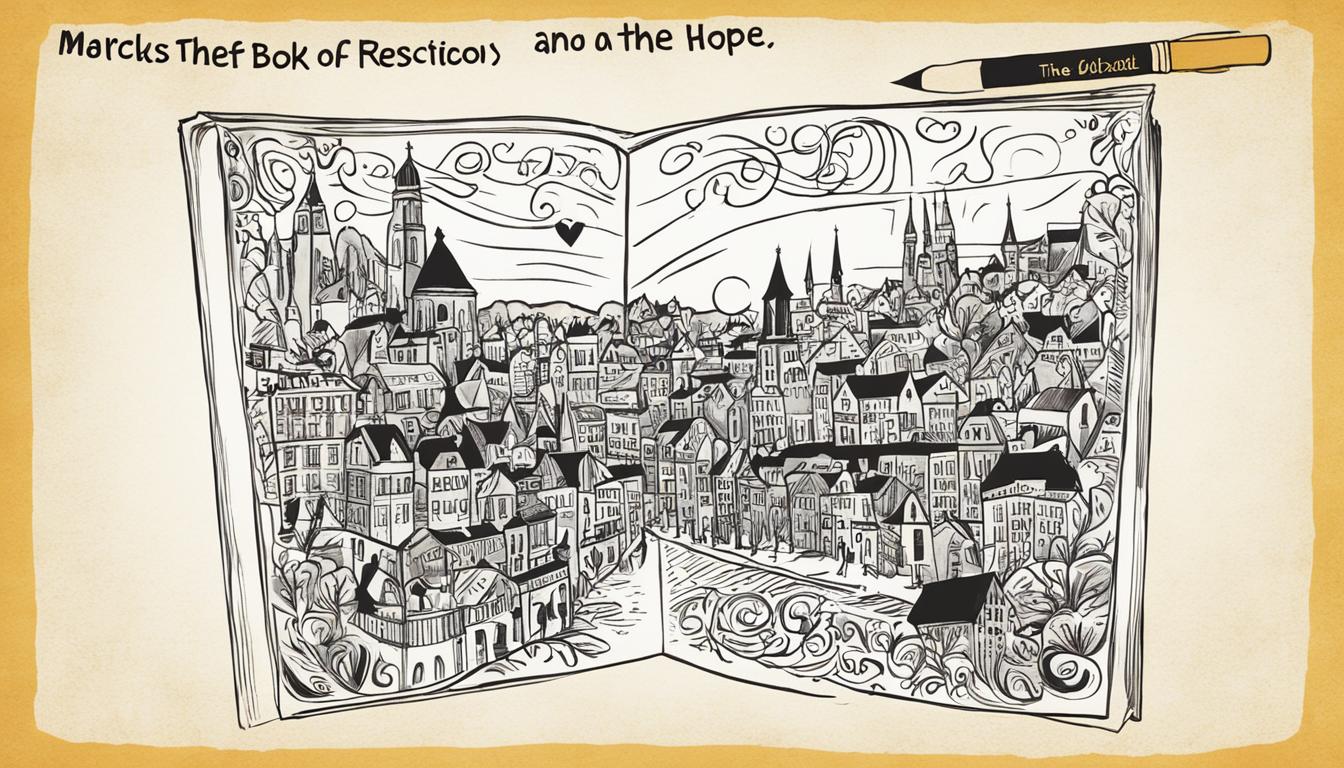If you’re a fan of gripping historical fiction and are looking for your next great audiobook, look no further than Markus Zusak’s “The Book Thief” in its audiobook format. In this review, we’ll explore the captivating storytelling, immersive sound design, and top-notch narration that make this audiobook a must-listen for fans of the genre.
Set in Nazi Germany during World War II, “The Book Thief” follows the journey of a young girl named Liesel as she learns to read and discovers the power of literature amidst the turmoil of war. Zusak’s vivid prose and poignant characters make for a truly unforgettable listening experience that will keep you hooked until the very end.
Key Takeaways
- Markus Zusak’s “The Book Thief” is a must-listen for fans of historical fiction.
- The audiobook format brings Zusak’s characters and storytelling to life in an immersive way.
- The narrator’s performance and voice acting are top-notch and enhance the listening experience.
- The book’s historical context adds depth and resonance to the story and characters.
- Overall, “The Book Thief” in its audiobook format is a captivating and unforgettable listening experience.
Overview of “The Book Thief”
“The Book Thief” by Markus Zusak is a poignant and captivating tale set against the backdrop of World War II. The story follows a young girl named Liesel Meminger, who finds solace in books amidst the chaos and destruction of the war. The book explores themes of hope, love, loss, and the power of words.
The audiobook format of “The Book Thief” offers a unique listening experience, with the narration bringing the characters and story to life. The book has won numerous awards and has been widely praised for its emotional depth and thought-provoking narrative.
The audiobook version of “The Book Thief” is a compelling way to experience the story, with the added benefit of the narrator’s performance and the immersive sound design. It is an excellent choice for anyone who wants to fully immerse themselves in the world of Liesel and discover the power of words and storytelling.
The Narrator’s Performance
The audiobook narrator can make or break an audiobook, and in the case of “The Book Thief,” narrator Allan Corduner’s performance is nothing short of exceptional. With his remarkable voice acting skills and precise enunciation, Corduner brings life to the characters and vividly captures the essence of each scene. His cohesiveness with Markus Zusak’s storytelling makes for a truly immersive listening experience.
Throughout the audiobook, Corduner showcases his ability to embody individual characters with nuance and depth, bringing a unique energy and approach to each one. He effortlessly navigates between the book’s many accents and dialects, creating a captivating and dynamic audio experience. Corduner’s performance enhances the emotional depth of Zusak’s words, creating an unforgettable listening experience.
Character Development in Audio
One of the key advantages of experiencing “The Book Thief” in its audiobook format is the way it enhances character development. The medium provides an opportunity for characters to come to life, almost as if they are speaking directly to the listener. This deeper understanding of the characters creates a strong emotional connection, allowing listeners to empathize with their struggles and triumphs.
The narration by Allan Corduner presents each character with unique voices, accents, and nuances, adding to the listener’s understanding of their personalities. Liesel’s voice, for example, is portrayed with a soft and gentle quality, highlighting her innocence and vulnerability. Her foster father Hans Hubermann’s voice, on the other hand, is gruff and deep, reflecting his strength and protective nature.
Through the audiobook format, Zusak’s writing is brought to life in a way that adds emotional depth to the story. Listeners gain a deeper understanding of the character’s motivations and the impact of their actions. The audiobook almost acts as a window into the characters’ minds, allowing us to better understand their thoughts and feelings.
The Impact of Audio Experience
The audio experience allows listeners to become fully immersed in the world of “The Book Thief,” enabling them to experience the story at a deeper level. As the story is told aloud, the listener’s attention is consistently held and engaged in the character’s experiences.
In addition to a more engaging experience, character development in audio provides a unique and impactful way to experience Zusak’s writing. Through this medium, the emotional depth of the narrative is enhanced, allowing listeners to fully appreciate the themes and motifs of the story.
Immersive Sound Design

One of the most remarkable aspects of “The Book Thief” audiobook is its immersive sound design. The meticulous attention to detail in creating sound effects and background music enriches the listening experience and transports the audience to 1930s Nazi Germany. The creaking of doors, the sound of bombs, the rustling of leaves, and the melody of accordion all add to the vivid atmosphere of the audiobook.
Through sound design, listeners can hear the narrator’s breath, footsteps, and other subtle nuances, bringing a greater level of realism to the audio experience. The sounds of nature and oppression juxtapose with each other, emphasizing the emotional turmoil of the characters.
The sound design adds an extra layer of depth to the story, making it a truly immersive experience for the listeners. The dynamic interplay between audio effects and narration engages the audience throughout the audiobook.
Engaging Plot and Narrative Structure
One of the most significant strengths of “The Book Thief” audiobook is Markus Zusak’s engaging plot and narrative structure. As the story unfolds, Zusak employs various literary techniques to captivate listeners and keep them invested in the story.
The novel is divided into ten parts, each with a series of short chapters. This structure creates a sense of urgency and momentum, propelling the plot forward and keeping listeners engaged throughout. The use of Death as a narrator adds an extra layer to the story, providing insights into characters’ thoughts and actions while maintaining an objective perspective.
Another technique that contributes to the engaging storytelling is the frequent use of foreshadowing and flash-forwards. These elements build suspense and anticipation, encouraging listeners to eagerly anticipate what will happen next. Zusak’s masterful use of descriptive language also adds depth and richness to the story, allowing readers to visualize the characters and settings vividly.
All of these elements come together to create a powerful and compelling listening experience that is true to Zusak’s intent. Whether you’re a fan of audiobooks or just looking for an engaging story, “The Book Thief” is certainly a must-listen.
Impact of Historical Context

“The Book Thief” is set during World War II, a period of immense significance and trauma in human history. Zusak’s depiction of this historical context adds a profound layer of depth and resonance to the story. Through the eyes of a young girl in Nazi Germany, we see the impact of war and oppression on ordinary citizens, and the destructive nature of hate and propaganda.
The Holocaust, in particular, is a central theme in the book, and Zusak handles it with sensitivity and care. He explores the heartbreaking realities of the genocide, and its impact on those who survived and those who didn’t. The characters’ experiences highlight the importance of empathy, compassion, and resilience in times of great adversity.
The historical context also serves as a backdrop for the characters’ personal journeys. Liesel learns about the world around her through books, which are often seen as subversive and dangerous in Nazi Germany. Her relationship with Max, a Jewish man hiding in her basement, shows that humanity and kindness can exist even in the darkest of times. The impact of the historical context on the characters’ lives serves as a reminder of the power of the individual, and the importance of standing up for what is right.
Critical Reception and Awards
Since its release, “The Book Thief” audiobook version has garnered critical acclaim and numerous awards. The audiobook was praised for its excellent narration, sound design, and emotional depth.
The audiobook received a starred review from Publishers Weekly, which said, “Zusak’s unforgettable story is enhanced by superb narration.” The audiobook was also nominated for a Grammy Award for Best Spoken Word Album in 2007.
It has won several prestigious literary awards, including the Michael L. Printz Honor and the Kathleen Mitchell Award for Excellence in Young Adult Literature. The audiobook was also a finalist for the National Book Award and the Los Angeles Times Book Prize.
The critical reception to the audiobook was overwhelmingly positive, with many reviewers praising Zusak’s writing and the outstanding narration. The audiobook continues to be regarded as a must-listen for fans of Markus Zusak and anyone interested in powerful storytelling.
Table of Awards and Nominations:
| Award | Category | Outcome |
|---|---|---|
| Grammy Awards | Best Spoken Word Album | Nominated |
| Michael L. Printz Honor | Best Young Adult Book | Won |
| Kathleen Mitchell Award | Excellence in Young Adult Literature | Won |
| National Book Award | Young People’s Literature | Finalist |
| Los Angeles Times Book Prize | Young Adult Fiction | Finalist |
Comparison to the Print Version
The print version and audiobook of ‘The Book Thief’ offer distinct reading experiences. While the print version allows readers to create their own interpretation of the story, the audiobook immerses listeners in the world of the characters through vivid narration and sound design.
One advantage of the print version is that readers can easily refer back to previous pages or chapters for clarity or reference. In contrast, the audiobook requires listeners to remember details from earlier sections or use bookmarks to navigate the audio file.
However, the audiobook’s immersive sound design and captivating narration provides a unique experience that cannot be replicated in the print version. Voice actor Allan Corduner delivers exceptional voice acting, bringing the characters to life with distinct voices and accents.
The audiobook also heightens emotional moments with music and sound effects that transport listeners to the world of ‘The Book Thief.’ The print version, while still a compelling read, cannot match the immersive quality of the audiobook.
Print Version Pros:
- Allows readers to create their own interpretation of the story
- Easy reference to previous pages or chapters
Audiobook Pros:
- Immersive sound design
- Captivating narration by Allan Corduner
- Emotional enhancement through music and sound effects
Conclusion
As we wrap up our audiobook review of “The Book Thief” by Markus Zusak, it’s clear that the audiobook format enhances the overall experience of the story. The combination of Zusak’s compelling storytelling and the narrator’s performance creates a captivating and emotional journey for listeners.
The immersive sound design and audio effects also add an extra layer of depth to the world of “The Book Thief,” making it a truly unique and memorable listening experience.
While the print version of the book may offer a different reading experience, the audiobook format is highly recommended for those who want to fully immerse themselves in the world of the story and the characters within it.
In conclusion, “The Book Thief” audiobook is a must-listen for those who enjoy engaging storytelling, historical fiction, and emotional depth. It’s no wonder why the audiobook has received critical acclaim and numerous awards. Overall, it’s a powerful and moving story that is sure to leave a lasting impact on its listeners.



